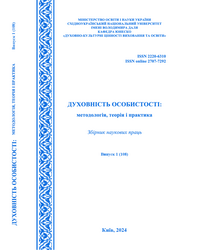THREAT MONITORING AND ANXIETY IN THE CONTEXT OF SOCIAL CRISES: THE ROLE OF PSYCHODIAGNOSTICS AND HEALTH BEHAVIOR OF WOMEN
DOI:
https://doi.org/10.33216/2220-6310/2024-108-1-6-17Keywords:
social crises, psychological influence, psychodiagnostics, quality of life, psychological state, health-saving behavior, mediaAbstract
Societal crises can have catastrophic consequences for people's psychological well-being, causing impacts on the individual's mental health. These changes include increased anxiety, fatigue, acute stress reactions, cognitive impairment, depression, personality changes, anxiety disorders, and post-traumatic stress disorder. Methods. A comparative analysis of existing studies on the chosen topic was conducted, and certain important areas and groups of influence were identified. Results. It has been found that social crises (such as the COVID-19 pandemic and military operations) have a significant impact on mental health. The spread of the coronavirus around the world has led to changes in national behavioral patterns and the cessation of normal daily human activities, and the introduction of physical (social) distancing practices. The analysis of the clinical and psychopathological symptoms of women with adjustment disorder shows the dominance of anxiety and depressive symptoms in mixed and isolated forms in the structure of symptoms. A significant increase in the level of anxiety and depression is found in women. According to the analysis of the questionnaire for the severity of psychopathological symptoms in war conditions, the prevalence of phobic anxiety and somatization with the presence of distress was observed in internally displaced women. Conclusions. In a society going through a crisis, there is a need to diagnose behavioral disorders, anxiety, depression, and post-traumatic stress disorders. Timely psychodiagnostics and effective psychological assistance will help reduce anxiety and improve health behavior in the face of a social crisis.

